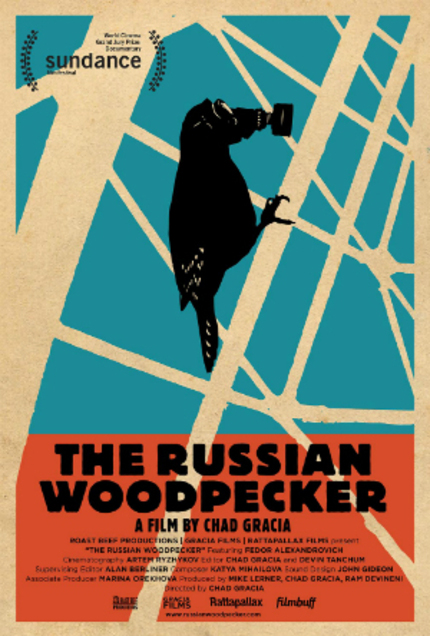Warsaw 2015 Review: THE RUSSIAN WOODPECKER, A Doc With Strong Storytelling And Wild Ideas

Neither of the two is a close call, as The Russian Woodpecker refers to a low-frequency noise emanating from radios tracked to Mother Russia. The Kremlin´s whim during the Soviet era serves as a brick in a tempting narrative structure that plays as a compellingly written thriller.
Gracia, an American-Portuguese theatre director, scrutinizes the corroded relationship between Russia and Ukraine, an actual theme that turned sour from an odd vantage point. Framing the extravagant odyssey with the events in Maidan in 2014, the protagonist, investigator and host of the documentary is local eccentric artist-cum-political activist, doe-eyed and shaggy-haired Fedor Alexandrovich.
Through his personal history, he unveils a crazy yet gripping scheme behind the infamous Chernobyl accident of 1986. The young artist vividly harbors traumatic memories about the meltdown of nuclear reactor no. 4, as he was temporarily displaced into an orphanage after the massive evacuation of the contaminated perimeter. The stigma imprinted in his memory also has a literal counterpoint: strontium nested in his bones.
The camera follows the artist wandering through the maze buried under the sands of time and ashes of destroyed archives, stalwart to crack the mystery of Chernobyl, which he doesn't consider a perverse twist of fate nor a product of coincidence. On the contrary, adamantly convinced of foul play, the protagonist pursues a thin thread leading to the upper echelons of the then-ruling party through the string of fleeting imprints suggesting degenerate man-made catastrophe. His hypothesis gravitates towards a full-blooded conspiracy theory, yet still not ridiculous enough to reach alien-anal-probe level.
Gracia, conscious of the emerging potential of the story meticulously constructed in the final product, uses Alexandrovich as a medium to uncover the sins of the past though his personal experience. He creates allusions and parallels to the present times, offering Alexandrovich's take on Ukraine and Russian turbulent conflict.
Foremost, The Russian Woodpecker is a portrait of a particular person directly touched by the events of Maidan and Chernobyl, and the circumstances of the current geopolitical situation in Ukraine. The documentary, though, is driven by his zeal of connecting the dots of two history-defining events into an unlikely scheme.
In the end, the process of research appears to be as substantial as the intended outcome of pointing fingers at the culprit. The little pieces in gargantuan, opaque and wild mosaics appear to be hiding the inherent capacities thought to be eradicated, forsaken and forgotten. What was regarded as something never to be repeated proves to be dormant, and in case of striking the wrong chords, even fully operating.
The Russian Woodpecker should not be regarded as an elaborate and scare-mongering mystification, though Alexandrovich radiates strong belief and his demeanour carries an anti-Russian agitation subtext. Gracia himself describes the film as "a tale of Ukraine's history and conflict through the eyes of an irradiated madman," displaying sufficient distance from the subject and his opinions.
Without further discussing the veracity of Alexandrovich's conviction -- the disclaimer at the beginning informs viewers that the film does not seek to harm relations between Ukraine, Russia and Belarus, the reason for such precaution revealed later -- and thought-provoking elucidations, The Russian Woodpecker as a cinematic feat disposes of an impressively crafted storyline implying honed narrative skills, as well as an exemplary use of gripping twists and turns. The reasonable running time of 83 minutes and the lack of irrelevant or impotent digressions suggest conscious trimming and enduring concentration on the main plotline, keeping viewers devoutly glued to screens.
Gracia well respects the conventions of docu-filmmaking, using archival footage, newspaper collages or instructive presentations along with the obligatory head-talking scenes, though he carefully calculates their placing knowing when to pull them. The same applies to the use of comic elements.
When Alexandrovich inquires of his former apparatchiks, the director either keeps Fedorov in the frame or provides a reverse shot on the protagonist whose face, eye-rolling, providing a sort of a litmus paper to interviewees' proclamations, never falling, however, into outright mockery. The situations perceived as comic in the first place provide an unlikely backdrop to buried mechanisms.
At one point, an elderly Soviet disciple bluntly ignores a question and out of the blue starts reciting the advocacy of Stalin with a glass-eyed gaze. Such moments unmask the deeply-rooted indoctrination that has not been eradicated. The presence of a phantom menace prompts the protagonist to address the dormant forces as "a ghoul" or better identified as "living dead".
The director paints an intense and gripping picture of Alexandrovich's venture down the paranoid rabbit hole of ex-Soviet apparatchiks and engineers, which the protagonist grasps with equally paranoid grip at one point contributing to the most powerful scene in the film. The scrutinizing eye slowly yet boldly drifts from the ghost town where dosimeters run wild to grand-scale politics.
Nevertheless, The Russian Woodpecker yields a rare gripping and engaging cinematic experience and it would not lose an ounce of its storytelling credibility even if Gracia and Alexandrovich pulled The Spinal Tap. Likewise, the Russian-Ukrainian exposé and the social statement of the film do not lose value, even if the protagonist crusade turns out to be manipulatively bogus and delusional phantasmagoria. Having an artist and anti-Russia political activist as the subject on the controversial theme sows handful seeds of doubts; the insider's vantage point gives an unexpected angle and perspective to news headlines.
The Russian Woodpecker is available worldwide on iTunes, Vimeo, Amazon and Google Play.
The Russian Woodpecker
Director(s)
- Chad Gracia
Writer(s)
- Chad Gracia
Cast
- Andrei Alexandrovich
- Fedor Alexandrovich
- Igor Alexandrovich
- Natalia Barabovskaya

Do you feel this content is inappropriate or infringes upon your rights? Click here to report it, or see our DMCA policy.






